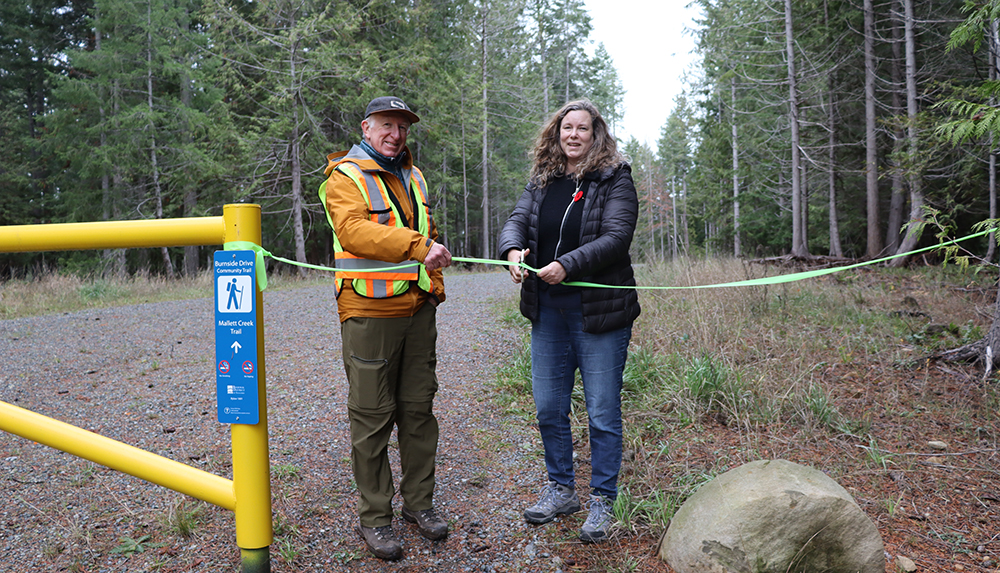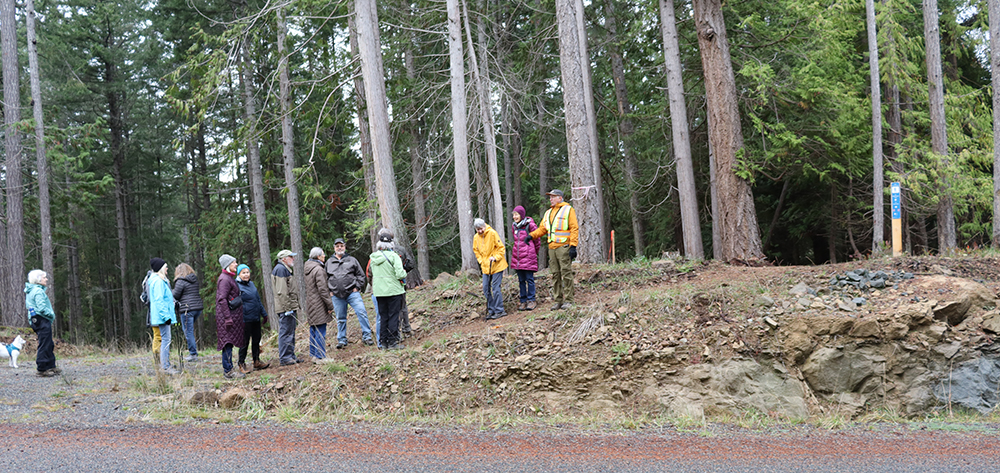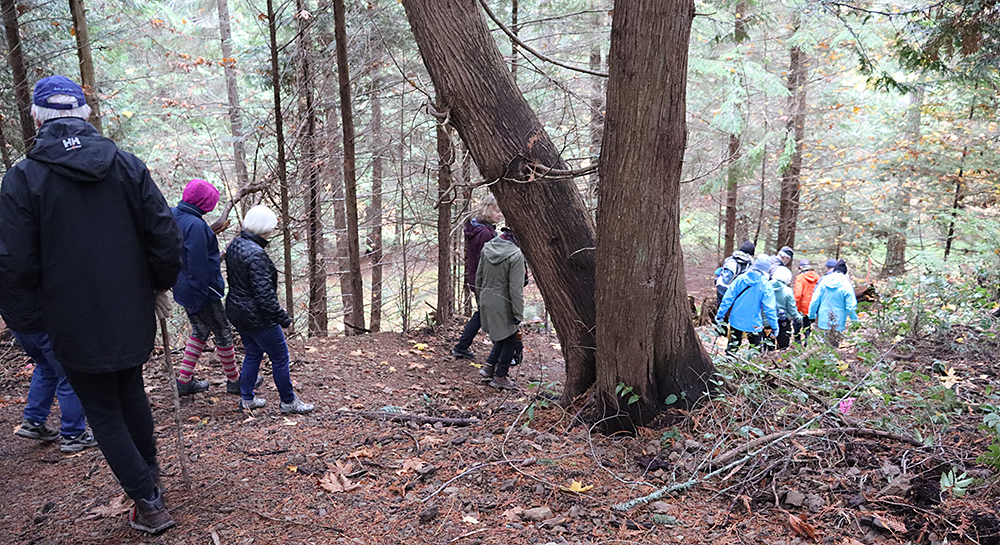
The new trail – Hugh Skinner, President of the Gabriola Land and Trails Trust, and Vanessa Craig, Director for Regional District of Nanaimo Electoral Area B, cut the ribbon officially opening the new trail connecting Gabriola’s village core to Cox Community Park. Derek Kilbourn photo
Derek Kilbourn
Sounder News
The budget for the Gabriola Fire Protection Improvement District (GFPID) being sent in to the Province for approval is up $180,138 over the 2023 levy, an increase of 21%, for a total of $1,021,958.
John Moeller, Chair of the Finance Committee for the GFPID Board presented the draft budget at the October 4 meeting of the Board.
Starting from the top of the budget lines, Moeller explained the new Deputy Chief position is included in the Wages and Benefits line.
He said the Deputy Chief position is not the entire increase in the Wages line, as that position is being created with three other roles – Prevention Officer, Training Officer, and Duty Officer – being amalgamated.
The Senior and Junior Day Firefighter positions are still being kept – these are positions filled by firefighters who do day to day work in the halls, while also being available for a 90-second response if there is a call for service.
Moeller said the increase also includes the contract position created for an accountant, which was posted by the District to help staff catch up on work being delayed due to meeting Freedom of Information requests made to the District.
Moeller said the insurance line has gone up quite a bit – partly because all insurance coverage is going up. Another reason for the increase is the new Fire Hall has been reassessed from when it was originally built for $5 million. The building is now valued at $8 million. The insurance line is the cost of insurance for all the Fire Department assets, including the Fire Halls and all the vehicles, as well as liability for the firefighters.
Truck operation costs are down, as there is nothing projected for major repairs or services in 2024.
Telephone and Utilities is an amalgamated line from various lines from the previous budget, with some increase with the addition of a cell phone for the Deputy Fire Chief.
Training is up slightly, with people being sent to courses as they need them.
Firefighting equipment and maintenance. Moeller said this has gone up by $12,000.
A cost on this line is equipping new recruits.
Moeller said the department is trying to be more professional, in giving everyone station uniforms.
The department is also going to start purchasing wildfire uniforms, which are different than the usual turnout gear.
Moeller said while the wildfire gear is expensive, a number of members are going out on wildfire deployments. Doing this, said Moeller, brings money into the department, and the firefighters get experience with actual wildfires, so it is only fair to get firefighters the right equipment.
First Responder (ie: medical response) supplies and maintenance has gone down. Moeller said this is partially because the Board has reallocated $5,000 from this which was determined to be Firefighter equipment, that was allocated to the line above.
Professional fees, this is the annual audit. The accountant makes up $15,000 of this. Human Resources and Legal are also included in this line, and have been increased.
Moeller said there have been a lot of things going on that have been different – such as an increase in Freedom of Information (FOI) requests, Human Resources issues and various legal matters the Board has needed to deal with. “Hopefully that doesn’t continue into 2024, but it was an overage in 2023.”
Office and Trustee is a catch-all line for General Election costs. Ballots, Returning Officer.
Firefighters Association is a grant given every year to the firefighters to provide them with a weekly meal after practice.
Building Ground and Maintenance is for lawn mowing, salting, snow plowing, and minor repairs on the building.
Moeller said there are plans to do Firesmarting around both Fire Halls and to fix up the yard in 2024.
Advertising and Promotion is up, as costs of that have gone up according to Moeller.
Travel – this is a new line, created for when the vehicles go over to Nanaimo for driver training.
Hydrant Maintenance has not changed, this is to upgrade pipes and whatever else is required.
Emergency Response was something the Board had budgeted in 2023, which didn’t cost as much as anticipated for 2023, so it has been reduced by $4,000.
EMR/FR training. Moeller said this is the new medical certification that the Department is working to. This line of $16,000 is to train new people as they are brought on. Moeller pointed out that the department has trained two instructors. The long term plan is to train EMRs (Emergency Medical Responders) for other fire departments.
Moeller said, “we’ll be able to charge for that, to offset the cost of training our own staff. The long term idea is it should be a balance of zero. If we can attract enough recruits to train here, that will offset the cost of training our own staff. It will take a few years to build up that reputation. For the time being, that’s to train our own staff up to the EMR standard.”
Moeller said bottom line, the operating budget is up $124,638 from last year.
“As you heard from the Chief, call volumes continue to increase. We’ve brought the First Responders up to EMR standard. And inflation has been crazy.”
In terms of the annual capital expenses, Moeller explained that the items which are replaced as part of an ongoing cycle have also gone up in price.
Turnout gear, according to Moeller, has doubled in cost in the last year. It now costs $4,500 per firefighter for gear. The department replaces four of those each year. Two sets of SCBA gear are replaced each year, at a cost of $10,000 each.
The budget for pagers is $7,000. A new AED is also being purchased, along with other items.
Once he had presented the budget, Moeller said there is something that doesn’t show up on the budget line, and that’s any debt that the District has maturing in 2024.
In the past, when the District planned for capital purchases, they would go to the Province. The Province would post the money, and collect the debt straight off the tax levy. So that would not show s part of the District budget.
Roughly 20 years ago, the District shifted to pre-collection method. It now controls its own capital reserve budget, with money earmarked for trucks and buildings. When the District needs a truck, it buys a truck. But – there are were some debts remaining from the previous years. Moeller said there is a bond retiring this year from the last of the trucks purchased through the old system. One bond will remain – from the construction of the new hall.
Moeller estimated the elimination of the bond should take $35,000 off the budget that taxpayers will be levied on.
In order to send the budget to the Province for approval, the Board has to pass a bylaw.
Bylaw 103, the Fire Protection Taxation Bylaw 2024, was voted on and unanimously approved by the Board at the October 4 meeting.

The new trail – Above photo: Attendees of the ribbon cutting enter the section of the trail built by GaLTT volunteers begins at the opposite end of the subdivision road that connects to Burnside Drive. The pedestrian trail is the key link between the subdivision and Cox Community Park, with a bridge over Mallett Creek constructed by GaLTT volunteers. Below photo: attendees of the ribbon cutting head down the switchback of the new trail towards Mallett Creek.






Recent Comments